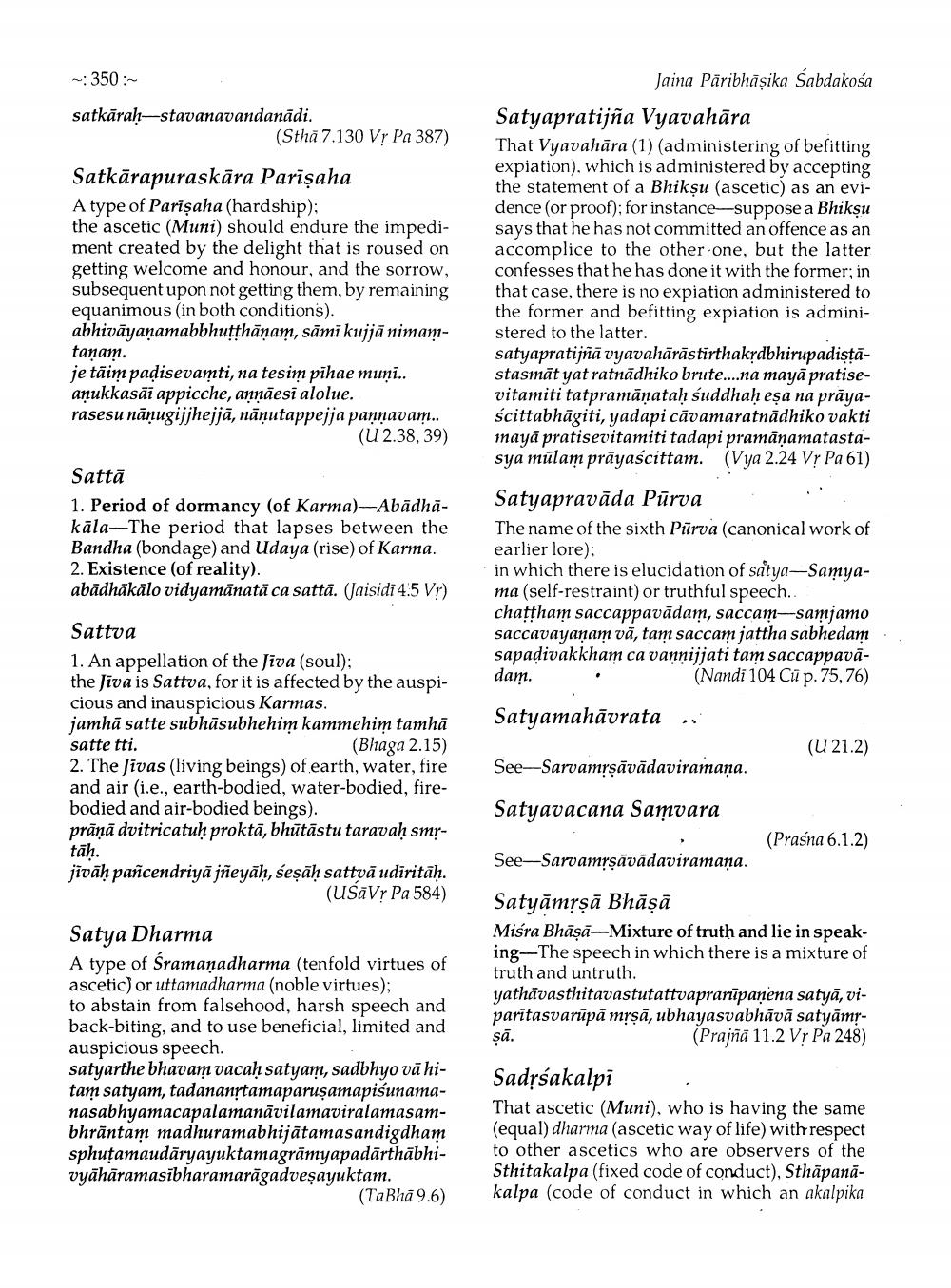________________
350:
satkārah-stavanavandanādi.
(Sthā 7.130 Vr Pa 387)
Satkārapuraskāra Parişaha A type of Parişaha (hardship); the ascetic (Muni) should endure the impediment created by the delight that is roused on getting welcome and honour, and the sorrow, subsequent upon not getting them, by remaining equanimous (in both conditions). abhivāyaṇamabbhutthānam, sāmi kujjā nimamtanam. je tāim padisevamti, na tesim pihae muni.. anukkasāi appicche, annāesi alolue. rasesu nāņugijjhejjā, nānutappejja pannavam..
(U 2.38, 39)
Jaina Päribhāṣika Sabdakosa Satyapratijña Vyavahāra That Vyavahāra (1) (administering of befitting expiation), which is administered by accepting the statement of a Bhikṣu (ascetic) as an evidence (or proof); for instance--suppose a Bhikṣu says that he has not committed an offence as an accomplice to the other one, but the latter confesses that he has done it with the former; in that case, there is no expiation administered to the former and befitting expiation is administered to the latter. satyapratijñā vyavahārāstirthakrdbhirupadistastasmät yat ratnādhiko brute....na mayā pratisevitamiti tatpramāṇataḥ śuddhaḥ eşa na prāyaścittabhāgiti, yadapi cāvamaratnādhiko vakti mayā pratisevitamiti tadapi pramānamatastasya mūlam prāyaścittam. (Vya 2.24 V? Pa 61)
Sattā 1. Period of dormancy (of Karma)-Abādhākāla-The period that lapses between the Bandha (bondage) and Udaya (rise) of Karma. 2. Existence (of reality). abādhäkālo vidyamanatä сa sattā. (Jaisidi 4.5 Vr)
Satyapravāda Pūrva The name of the sixth Pūrva (canonical work of earlier lore); in which there is elucidation of satya-Samyama (self-restraint) or truthful speech. chattham saccappavādam, saccam-samjamo saccavayanam vā, tam saccamjattha sabhedam sapadivakkham ca vannijjati tam saccappavadam.
(Nandi 104 Cū p. 75,76)
Satyamahāvrata
Sattva 1. An appellation of the Jiva (soul); the Jiva is Sattva, for it is affected by the auspicious and inauspicious Karmas. jamhä satte subhāsubhehim kammehim tamhā satte tti.
(Bhaga 2.15) 2. The Jivas (living beings) of earth, water, fire and air (i.e., earth-bodied, water-bodied, firebodied and air-bodied beings). prāņā dvitricatuh proktā, bhūtāstu taravah smr
(U 21.2)
See-Sarvamrşāvādaviramana. Satyavacana Samvara
(Praśna 6.1.2)
tāḥ.
See-Sarvamrşāvādaviramaņa.
jivāḥ pañcendriyā jñeyāḥ, śeşāḥ sattvā udiritāḥ.
(USãVPa 584)
Satyāmrşā Bhāṣā Miśra Bhāṣā-Mixture of truth and lie in speaking-The speech in which there is a mixture of truth and untruth. yathāvasthitavastutattvapranīpanena satyā, viparitasvarūpā mịşā, ubhayasvabhāvā satyāmr
(Prajna 11.2 VỊ Pa 248)
şā.
Satya Dharma A type of Sramanadharma (tenfold virtues of ascetic) or uttamadharma (noble virtues); to abstain from falsehood, harsh speech and back-biting, and to use beneficial, limited and auspicious speech. satyarthe bhavam vacaḥ satyam, sadbhyo vā hitam satyam, tadananytamaparuşamapiśunamanasabhyamacapalamanāvilamaviralamasambhrāntam madhuramabhijātamasandigdham sphutamaudāryayuktamagrāmyapadārthābhivyāhāramasibharamarāgadveşayuktam.
(TaBhā 9.6)
Sadrśakalpi That ascetic (Muni), who is having the same (equal) dharma (ascetic way of life) with respect to other ascetics who are observers of the Sthitakalpa (fixed code of conduct), Sthäpanakalpa (code of conduct in which an akalpika




